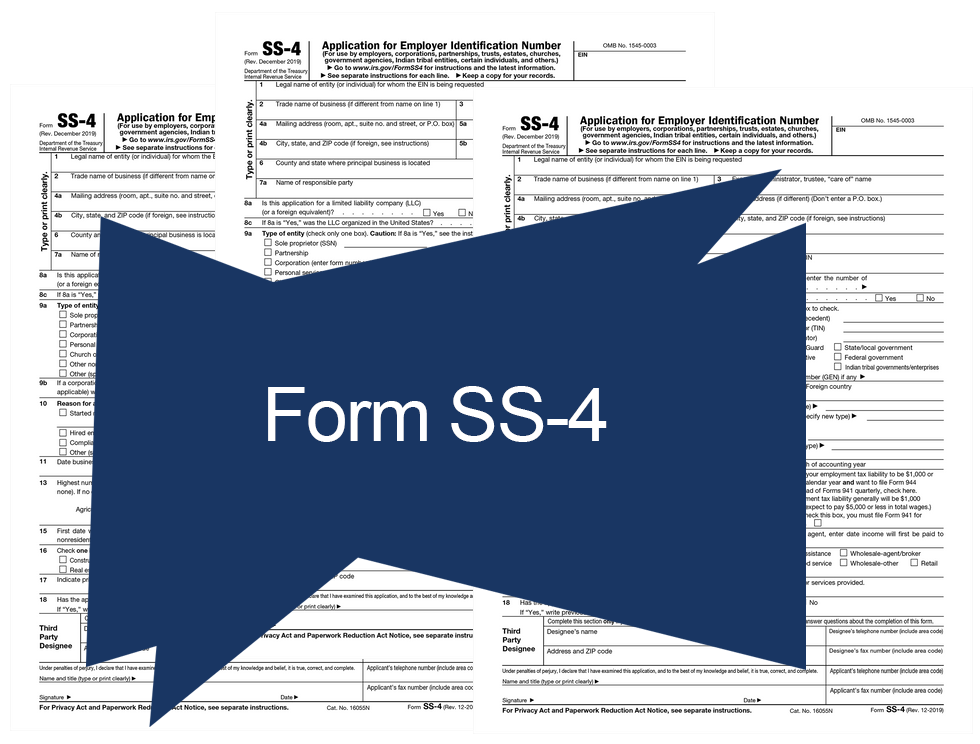Form SS-4
Form SS-4, or the Application for Employer Identification Number (EIN) form, is the form required by the United States Internal Revenue Service (IRS) to apply for an EIN. An EIN is a unique, 9-digit number assigned to business entities as a form of identification for tax purposes.

What is Form SS-4?
Form SS-4 is available for all entities whose principal place of business or legal residence is in the United States. The form is most often submitted online, though it is possible to apply for an EIN via fax (approximately 4 day turnaround), via paper mail (approximately 4 week turnaround) and by telephone (only for international applicants).
Eligibility requirements for SS-4 are straightforward. If you answer YES to any of the following questions, you need an EIN:
-
Do you have employees?
-
Do you operate your business as a corporation or a partnership?
-
Did you file any of these tax returns: Employment, Excise, or Alcohol, Tobacco, and Firearms?
-
Do you withhold taxes on income, other than wages, paid to a non-resident alien?
-
Do you have a Keogh plan?
-
Are you involved with any of the following types of organization?
-
Trusts, except certain grantor-owned revocable trusts, IRAs, Exempt Organization Business Income Tax Returns
-
Estates
-
Real estate mortgage investment conduits
-
Non-profit organizations
-
Farmers' cooperatives
-
Plan administrators
-
If you answer YES to any of the above questions, you will need an EIN.
Quick Tip - Applying online is the fastest way to get an EIN. Do not use your SSN in lieu of an EIN!
What do I need to file Form SS-4?
If you are confident you are eligible for an EIN (hint: if your principal business is located in the United States and you have a valid Taxpayer Identification Number [TIN]), you just need basic identifying information of your business.
Be sure to know the following:
-
Legal name (and trade name, if different) of the entity for whom the EIN is being requested
-
Contact information for the above
-
Name of responsible party, contact information, and SSN/ITIN/EIN
-
Type of business entity (e.g, Partnership, C-Corp, etc.)
-
Various business metrics around expected number of employees (if any), closing month of accounting year, principal business activity (e.g., construction, finance, etc.) and related information.
Interactive Form
1. Legal name of entity (or individual)
2. Trade name of business
3. EX, Adm, trustee, "care of" name
4. Mailing address
5. Street address
6. City, state, and ZIP code
7. City, state, and ZIP code
8. County and state of the business
9. Name of responsible party
10. SSN, ITIN, or EIN
11. Is this for an LLC?
12. Enter the number of LLC members
13. Was the LLC organized in The US?
14. Type of entity
15. Name the state or foreign country
16. Reason for applying
17. Date business started or acquired
18. Closing month of accounting year
19. Employee count in the next 12 months
20. File Form 944 annually?
21. First date wages or annuities paid
22. Choose what describes your business
23. Principal line for goods and services
24. Write previous EIN here
25. Applicable if form is for someone else
26. Name and title
27. Applicant's telephone number
28. Signature and Date
29. Applicant's fax number
Frequently asked questionst about the Form SS-4
Why do I need an EIN; isn't my SSN enough?
No. A social security number is a unique identification number assigned to you as an individual. An EIN is a unique tax identification number assigned to a business entity
You may use an SSN as a tax ID number only if you are a business entity that meets certain requirements for exemptions. The most common example of this is a sole proprietor with no employees and no intent to hire them. In this example, the business and entity are the same; therefore, it is permissible to use an SSN in lieu of an EIN.
What does it cost to apply for an EIN?
It is free to apply for an EIN through the IRS. However, it can take a tremendous amount of time if not done correctly. If you're having trouble or need help filing, GovTotal is here to help!
Who needs an EIN?
If you are a business structure that is any of the following:
-
Corporation;
-
Partnership;
-
Or Limited liability company (LLC)
OR
-
If you are aiming to file for bankruptcy;
-
Have employees or plan to have employees in the future; Offer or want to offer a solo 401(k) or Keogh retirement plan;
-
Are considering buying a solo proprietorship;
-
Are involved with trusts, IRAs, estates, non-profit organizations, farmers' cooperatives, plan administrators, estates, real estate mortgage investment conduits, or exempt organization business income tax returns;
-
File any of Employment, Excise, or Alcohol, Tobacco, and Firearms tax returns